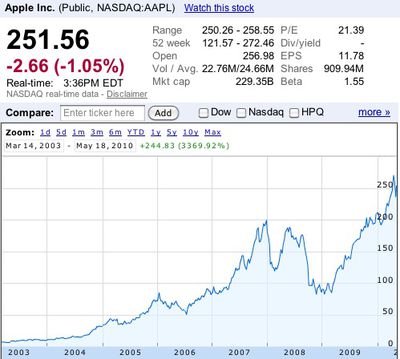
MarketWatch takes a look at "what might have been", examining Apple CEO Steve Jobs' decision to accept a March 2003 offer from the company to exchange his existing stock options for new ones at a more attractive price in comparison to the company's languishing stock price at that time, a move that would appear to have cost Jobs $10 billion in net worth at today's prices.
After the bursting of the tech bubble in early 2000, the Nasdaq Composite had plunged nearly 80% from its peak. Companies had folded left and right. Those left were staggering. Apple had fared as badly as any. Its stock had plummeted from a peak of $36 all the way down to about $7. (All prices have been adjusted for a subsequent stock split.)
With Jobs holding multiple lots of stock options with exercise prices of $9.15 (15 million shares) and $21.80 (40 million shares), his stake in those options was worthless at that time beyond the potential for share price increases to push the options into positive territory in the future.
Jobs was not the only Apple employee in that position, however, and when the company offered employees the opportunity to cancel their existing options in exchange for a significantly smaller number of options at a lower price, Jobs and others took the offer.
He volunteered to cancel all his options in return for a far smaller number of shares, worth about $75 million at the time. The trade made sense -- unless Apple boomed again.
Ahem.
The shares Jobs received are worth $2.5 billion at today's stratospheric prices.
Had Jobs held onto his original options, he would have seen them become profitable approximately a year and a half later and be worth $12.8 billion today. The difference means a missed opportunity of $10.3 billion for Jobs.
As the report notes, however, Jobs is of course not hurting for wealth, having been ranked the world's 136th richest person in Forbes' recent rankings. But the majority of Jobs' wealth comes from his holdings of Disney, where he became the company's largest individual shareholder after it purchased Pixar in 2006.
And there may have been another upside to Jobs' cancellation of his original stock options. A portion of those options, along with additional grants made to other Apple executives, was the focus of a backdating scandal, which resulted in an investigation by the U.S. Securities and Exchange Commission and the departure of former Chief Financial Officer Fred Anderson from Apple's Board of Directors and General Counsel Nancy Heinen from the company.





















